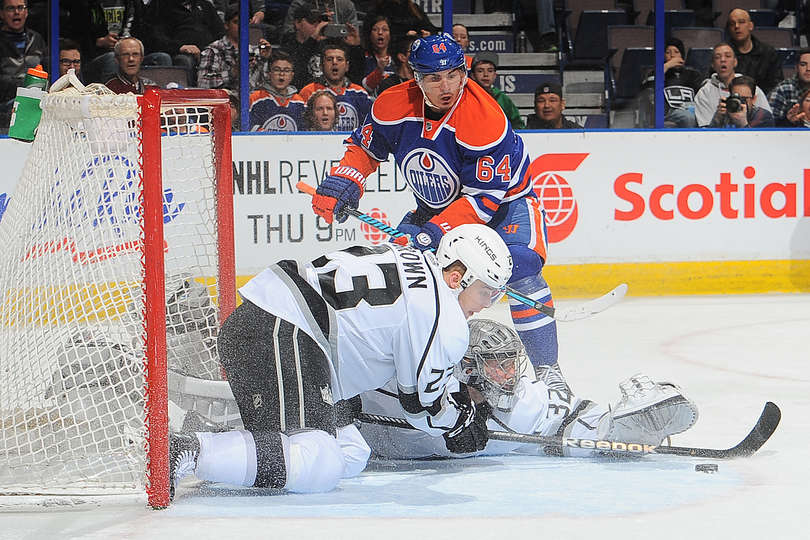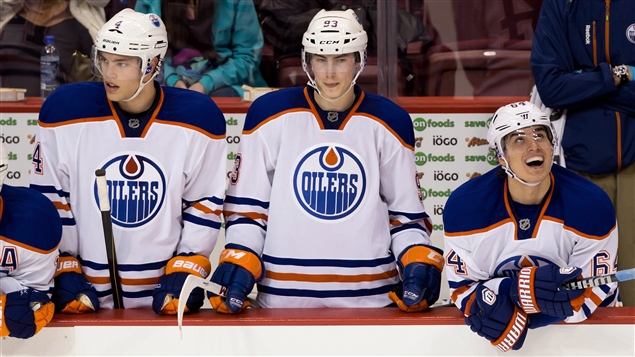Nail Yakupov had a rough go at it this season there is no doubt about it. He was often times lazy, outspoken, and came off as self-entitled at times. We all remember the joyous rookie who came to camp a mere two years ago, flashing his smile, relishing every opportunity, and celebrating each goal like it was his first. What we don’t know is where that kid went. Did the organization/NHL community yank it from him? It seems entirely possible that his “antics” unnerved some members of the old boys club around the NHL. That same club which says “act as though you’ve been there before” anytime someone celebrates at a level that is deemed embarrassing. This is the wrong direction to take. Celebrating success, no matter how small, is how people know their doing well. It is obvious that somewhere along the line Yak lost his happiness, and with it went the confidence to make plays and show emotions. Why did this happen, and can he get it back?
Some people have given up on him. His name gets thrown around as potential draft bust more often than any player at this stage in his career should. He is a mere 111 games into an NHL career, if he was a newborn child he would just now be learning to walk, stumbling all over causing raucous laughter from all watching on with fascination. Yet here we are, ready to shuffle him off all the while deep down worrying it would come back to haunt us almost immediately.
So just how bad was he this year? It is interesting to compare Yakupov in his rookie season and Yakupov in this past season:
| Season | G/60 | A/60 | P/60 | CF% | CF% Rel | FF% | FF% Rel | PDO |
| 2012-13 | 1.46 | 1.20 | 2.66 | 42.4% | -2.9% | 41.7% | -4.4% | 102.7 |
| 2013-14 | 0.73 | 0.87 | 1.60 | 44.9% | +0.8% | 45.6% | +1.7% | 95.7 |
This provides an interesting breakdown of Yakupov’s two seasons to date. Per 60 minutes, all of his offensive production decreased, significantly actually. However, right alongside that point production drop is his PDO dropping massively. His shooting percentage took a significant drop this season (from 10.6% in 2012-13 to 7.5% in 2013-14). Shot percentage is a fickle thing, it fluctuates for everyone. Even some of the best scorer’s of all time. For example, Pavel Bure (no I am not saying Yakupov is Bure…so relax on that front) had an off year in 1995-96 where he scored just 23 goals in 63 games with a SH% of 8.7%. Yes, 23 goals in 63 games is still very impressive. But for one of the most prolific goal scorers it was not an amazing season. The very next season he scored 51 goals in 82 games with SH% of 15.5%. The point is, shot percentage fluctuates. This can be due to a lot of factors including shot quality, confidence, injury, team systems, number of shots taken and games played.
Regardless, this drop in shot percentage was massive and played a significant role in Yakupov’s drop in goal scoring. This happens with young players sometimes, in his first season he was likely getting shots from better spots on the ice due to the other team being less focused/concerned with his scoring abilities. In this most recent season, teams finally had some tape on him, so they were able to create a game plan around him, which allowed them to force bad shots, rushed shots, shots of general poor quality. It is likely that his SH% will average out somewhere between the 10.6% and 7.5% and probably closer to the 10.6% side of things, if not higher than that. He has an incredible shot, with an incredible release. This is his strongest quality as an NHLer. Once the Oilers and Yakupov develop a game plan to help create open opportunities with higher quality scoring positions, his point production will increase.
Eakins was on the Fan 590 earlier this week, and he spoke about the difference in shooting perecentage between Yakupov's first and second seasons and the effect it had on the young player's confidence.
“This is a kid who I believe in his first year in a shortened season scored 17 goals. His shooting percentage, off the top of my head, I think was 21 percent. You look at the top shooters in the game, they don’t shoot like that. It’s hard to sustain. And with him coming out of the game like that, suddenly the expectation on a very inexperienced player is, ‘Well, he’ll just score 30 goals this year.’ Well, he’s not going to shoot at 21 percent for his whole career."

One of the more interesting aspects from above is his possession statistics. Under Eakins he was actually far better in this regard. The numbers are still poor, but the Oilers themselves were very poor in this area. The fact that he was in the positives for both CF% Rel and FF% Rel, these stats refer to the players Corsi % relative to the entire teams’ Corsi % when he is not on the ice. So being in the positives means he was actually quite a positive factor, relatively speaking. He was at least performing as well as the rest of the team. In just his second season this is impressive, and if anything points the finger at truly how poor the Oilers were in the puck possession game.
The Centerman and the Goalie
Another factor which hurt Yakupov this season was the difference in seasons for Sam Gagner. Gagner had an amazing year during the lockout shortened 2012-13 season. He played far better that season than any year since joining the NHL. His production during that season led many to believe he was finally on the rise. Of course we all watched as Gagner took a step back this past season. His ineffectiveness as a centerman no doubt played somewhat of a factor in Yakupov's drop as well. Gagner is not a legitimate second line center in the NHL and he never will be. Getting a second line center with a nice mixture of size, skill and hockey IQ would go a long way in the development of Yakupov.
It didn't help that the goaltending in Edmonton was sub-par to start the season. While Yakupov was on the ice, the goaltending SV% of the Oilers was a pathetic 88.2% (a significant drop from the 92.0% of his rookie campaign). When goals are being scored against at such a high clip it drags on a player and his coach. All of a sudden Yakupov lost favor with Eakins, and his defensive inefficiencies became a focus for the Head Coach. Opportunities were lost as a result, and Yakupov found himself with limited ice time at many points this season.
Time to Move on?
There is a growing chorus of fans and media in Edmonton who believe the right move is to consider Yakupov a lost cause and move on from this player. There are two problems here; first he had a rough season in terms of “luck”, far worse than what he will likely average out too in his career. Giving up on him now without seeing where these percentages average out too is a dangerous move. The team was partly to blame for his lack of success. He is not a player that can create goals individually, other players on the ice with him have to open up the ice and find him in the right spots. Eakins has to teach him and the rest of the Oilers a system that creates open scoring opportunities on the ice. For half the season Yakupov was either not given PP opportunities, or he was placed in poor shooting positions while on the PP. Placing a one-shot scorer below the hash marks is misguided. The chance to score from that position is miniscule, and more often than not shots fly wide from that spot. In Washington, Ovechkin is basically stapled to the area above the hash marks, but still below the blue line spot, this is his wheelhouse. The Oilers need to find Yakupov’s wheelhouse and work on finding him open shot opportunities. They have the puck-moving abilities, RNH and Eberle are two of the most sublime passers in the game, and they just need to create a PP that plays to the strengths of all involved.
The second reason moving Yakupov now is a mistake is that the potential of this player far outweighs one poor season. He is in the developmental stage and learning how to play a responsible game. When Hall, Eberle and Nugent-Hopkins entered the league, they were asked to be offensive stars. They were not asked to develop their games defensively, at least not immediately. They had time to build confidence through their offensive abilities. It wasn’t until this most recent season that they were truly asked to become complete hockey players. Yakupov for his part has seen some major upheaval in terms of team systems in his short tenure. It’s not even known if he was forced to play a system in junior hockey with the Sarnia Sting, followed by half a season in the KHL, and half a season in the NHL. These transitions are a lot to handle for a young player.
Coming into his rookie season Andrey Osadchenko at oilersnation.com got this quote from Yakupov when asking about his thoughts on the NHL:
"I don’t even know what it is – the NHL. I’ve been to five games in Detroit. I went to their locker-room once and met the Red Wings. But I don’t know what it is – the NHL. I don’t know how the NHLers live or how they practice. I know that everything is going to be different."

This is an illuminating quote to say the least. It highlights just how raw of a player he truly was, playing a lockout shortened season in his first year was not the best place for him to start. He was successful offensively no doubt, but in such a short season the "learning the NHL game" part that Yakupov himself mentioned, well that was put on the back burner. There simply was no time to force lessons on Yakupov and as result it wasn't until this past season that changes in his game were asked of him.
The system employed by Kreuger, and the one Eakins is trying to implement are radiaclly different. Yakupov doesn’t yet have the emotional/NHL experience to rapidly adapt to these changes. He needs time to learn. On top of this he has been thrust into an organization that has holes everywhere in the lineup. Placing blame on this player would be foolish in this scenario. He needs more than a season and a half, he needs stability, and he needs to be put in positions to succeed. Confidence is a different thing for everyone, and watching him play, watching him struggle and comparing all this to the exuberant young man that walked into Rexall as an 18 year-old, it becomes clear that he lacked the confidence to succeed this season.
This article is not about creating excuses for Yakupov. He still has to take it upon himelf to succeed. We all do every day, that is our own responsibility in life. It is simply an article preaching for some patience. The Oilers priority with Yakupov shouldn’t be using him as trade bait, it should be building up his confidence, teaching him the game, and allowing him the chance to succeed. Once they do those things it falls upon Yakupov to succeed or fail. But calling it a failure before he has had a legitimate chance to succeed would be this teams biggest failure.










































